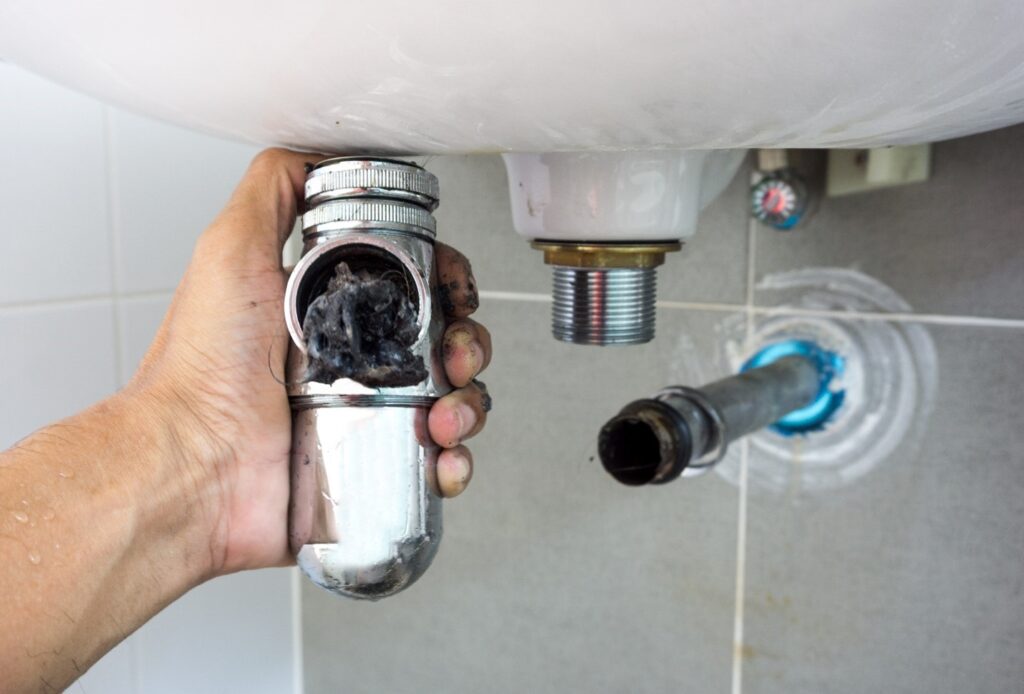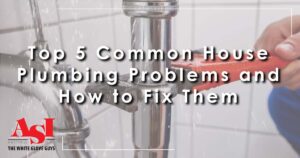Ever stepped into the shower only to be met with a weak trickle of water? Or wondered why your washing machine seems to take forever to fill up all the way? If this scenario sounds familiar, you could be experiencing issues with your home’s water pressure.
Low water pressure happens for a variety of reasons. But whatever the reason, it can be annoying and stressful. So whether you’re dealing with a weak stream in your sink or a trickle of a shower, stick around to find the cause and solution to your water pressure problem.
Signs of Low Water Pressure
Low water pressure makes simple tasks like showering or washing dishes a frustrating nightmare. If you’re experiencing low water pressure, there are several signs to look out for:
- Water doesn’t come out of the faucet immediately
- You hear a hissing sound before the water starts flowing
- The water pressure drops when more than one person uses it at once
- It takes ages to produce enough hot water for a shower or bath
What’s the Measurement Unit for Water Pressure?
Water pressure is measured in pounds per square inch (PSI). The PSI for your home’s plumbing should be between 40-60. Too low, and you end up with a trickle and possible damage to appliances as they struggle to work correctly.
On the other hand, if the water pressure is too high, it can cause burst pipes and leaks.
How to Measure Your Water Pressure
You don’t always need a professional to measure your water pressure. Instead, visit your local hardware store and buy a home water pressure gauge.
Hook up the gauge to your outside faucet. Seal well and turn on the water as far as the faucet will turn to get full pressure.
Take note of the reading on the gauge – that’s the PSI of your water pressure.
What are the Most Common Causes of Low Water Pressure?
Several factors can contribute to low water pressure in your home. However, finding the cause can be tricky, so if in doubt, call a professional.
Pipes are Clogged
Clogged pipes cause low water pressure because they reduce the space water needs to flow freely. Generally, clogs come from hair, food debris, and grease. But with older pipes, limescale is a common culprit.
This pesky mineral accumulates and hardens inside the pipes, reducing their diameter and making it harder for water to flow through.
A handy way to help reduce clogs is to use baking soda and white vinegar. It may sound like a weird baking experiment but place both down your drains, and the fizzing effect will help keep pipes clear from clogs.
There’s an Issue With the Main Water Supply
Before you call an ASI plumber or start pulling apart your pipes, remember to give your local water suppliers a call. It could be a problem with a mains pipe or something happening at their end rather than your plumbing.
photo here
If everything’s okay with the municipal supply, you may need to install a water pump booster. These devices add more pressure to the water before it reaches your home. Place one near the main supply line, and your water pressure should improve.
Pipe Corrosion
Leave something made from iron outside, and over time it’ll start to rust. This is because it reacts with water and oxygen, causing corrosion.
It’s no different with your water pipes. As the metal pipe reacts with the water, rust begins to build. The more rust, the narrower the pipe and the lower your water pressure.
If you notice discoloration or a strange taste in your water, the likelihood is rust. And unfortunately, the only cure is replacing the pipes.
Friction Slowing the Water Down
Supercars. They’re as sleek as possible, so they drive at lightning speed – the less friction with the air, the faster they go.
Pipe Corrosion
Leave something made from iron outside, and over time it’ll start to rust. This is because it reacts with water and oxygen, causing corrosion.
It’s no different with your water pipes. As the metal pipe reacts with the water, rust begins to build. The more rust, the narrower the pipe and the lower your water pressure.
If you notice discoloration or a strange taste in your water, the likelihood is rust. And unfortunately, the only cure is replacing the pipes.
Friction Slowing the Water Down
Supercars. They’re as sleek as possible, so they drive at lightning speed – the less friction with the air, the faster they go.
If you have any questions or want more information about low water pressure, our ASI team is ready to help! Give us a call today.









